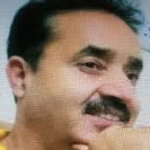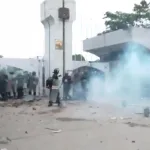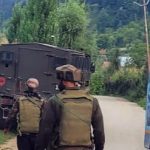CALL FOR RATIONAL REFORM
In Kashmir’s increasingly volatile social media landscape, even the most complex issues are often reduced to emotional soundbites. The recent uproar over an unfortunate incident at Paras Hospital is a glaring example. Before any expert inquiry could establish facts, the court of public opinion had already declared its verdict—replete with outrage, blame, and character assassination. In the process, a much-needed conversation about the larger healthcare crisis in Kashmir was lost.
While holding institutions accountable is non-negotiable, trial by social media serves no purpose—least of all for the patients. What is truly needed is a rational, policy-focused examination of how our healthcare system functions, why private hospitals are essential to improving patient care, and how the government sector—overburdened and underfunded—can no longer carry the weight of the Valley’s growing healthcare needs alone.
Kashmir’s public hospitals have long been the backbone of its healthcare delivery system. Facilities like Sher-e-Kashmir Institute of Medical Sciences (SKIMS), Government Medical College (GMC) Srinagar, and associated hospitals such as SMHS and Lal Ded have, for decades, provided crucial services. These institutions are staffed by dedicated professionals who work under enormous pressure. But the hard truth is this: they are overstretched beyond capacity.
With patients pouring in not just from urban areas but from remote districts, these hospitals often function far above their intended limits. Long queues, crowded wards, delayed surgeries, and overworked doctors are the norm. Basic diagnostic procedures can take weeks. In such conditions, the quality of care—no matter how well-intentioned the staff—inevitably suffers. Expecting this exhausted system to also cater to the increasing burden of lifestyle diseases like cancer, cardiac conditions, and renal failure is simply unrealistic.
This is where the role of private hospitals becomes not just helpful, but essential.
Private hospitals like Paras fill critical gaps—providing advanced diagnostics, specialized surgeries, and follow-up care that government hospitals, due to infrastructural and human resource constraints, are often unable to deliver in a timely manner. These institutions introduce modern technology, faster response systems, and the incentive structures that help attract top talent back to the Valley.
Yet, instead of being viewed as complementary to the public health system, private hospitals are often treated with suspicion. This mistrust becomes toxic when amplified on social media, where facts are scarce and accusations go viral in seconds. In the recent Paras Hospital case, respected professionals like Dr. Sheikh Zahoor Ahmad—an accomplished onco-surgeon with years of dedicated service—have found themselves dragged into controversy without a single expert panel having vetted the details.
Such vilification of senior doctors is not just unfair—it is dangerous. If highly qualified specialists feel unprotected by systems of fair inquiry, many will choose to leave. Kashmir cannot afford an exodus of expert hands. Already, many of our brightest medical minds choose to practice in metropolitan cities or abroad, where they feel professionally secure and valued. If this trend accelerates, it is ultimately the patients—especially those too poor to travel outside the Valley—who will suffer.
This suffering is already evident. In the absence of a strong network of private hospitals, thousands of Kashmiris are forced to travel to Delhi, Mumbai, Chandigarh, and elsewhere for specialized treatment. This medical migration places an enormous financial burden on families, depleting savings and incurring debts. The emotional toll is no less severe—being far from familiar surroundings in a time of crisis, navigating unknown healthcare systems, and bearing the logistical and psychological pressure alone.
And if a tragedy occurs in a hospital far from home, families face another daunting challenge: getting the deceased’s body back for last rites. No social media campaign offers support then. No “citizen journalist” raises questions about the systemic failure that forced the family to seek care hundreds of miles away. The silence is deafening—and telling.
To break this cycle, we need to shift focus from blame to reform. First, we must strengthen private healthcare through transparent regulation, tax incentives, and public-private partnerships. Second, and equally important, we must invest in universal health insurance so that every citizen, regardless of income, can access quality care without fear of bankruptcy.
Schemes like Ayushman Bharat are a start, but they need better implementation and wider reach in Kashmir. A well-regulated private sector coupled with universal insurance coverage can revolutionize healthcare outcomes—relieving public hospitals of non-critical burdens and ensuring that high-end care is available locally and affordably.
At the same time, the government must set up mechanisms for unbiased, expert-led investigations into medical mishaps—whether they occur in government or private hospitals. A transparent and trusted review process will not only uphold accountability but will also protect healthcare workers from unwarranted social media trials that erode morale and trust.
The future of healthcare in Kashmir cannot depend on outrage-driven narratives. It must rest on sound policy, institutional reform, and public trust. The goal should not be to pit public hospitals against private ones—but to make them work in tandem for the well-being of the people.
Let’s not lose our doctors to fear. Let’s not lose our patients to distance. Let’s build a system that saves lives—not reputations on Twitter.
(Author is a senior journalist and General Secretary of Press Club of Kashmir)









Good write up. But what has happened on ground. Has Paras Hospital or Health Care department appointed a committe to establish the cause of death. Just want to know. This article is another social media piece, if it has not addressed the core concerns of General population.